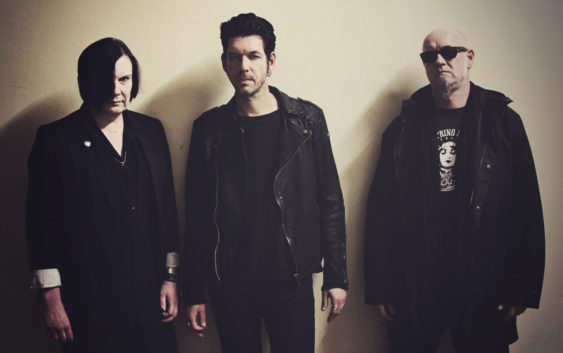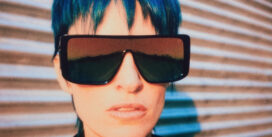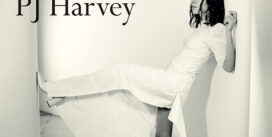Golden Apes is a German rock band from Berlin, founded in 1998 by Peer Lebrecht (vocals), Christian Lebrecht (bass) and Eric Bahrs (guitar). In 2001, drummer Nestor de Valley became a member of the Golden Apes and the result of the band’s now stronger and more intense sound was very dark. Live keyboarder Sven Wolff became a permanent member in 2003.
In late 2008 drummer Nestor de Valley was replaced by Joe Finck.
A little later in November 2009 Ika Mamrikishuili then took the place of Sven Wolff on synthesizers until the fall of 2010.
The music has continued to develop with a string of solid albums.
‘Kasbek’ is their tenth and latest album, released in 2019.
1. Golden Apes started in 1998, what has kept the group going?
Peer Lebrecht: As tritely as it may sound, I think the main impetus and the actual motivation was always the same… from the very first day to the moment when we listened to KASBEK after it was mixed. For nearly two decades now…
But what is it that makes you dedicate time, mind, perception and attention to a single subject mainly? What makes you spend your free time in cars, planes 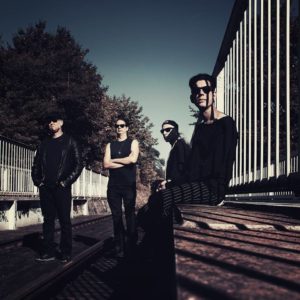 or trains just for revealing intimate insights and thoughts to people who are strangers to you mostly? What is it that gives all your conditions a certain kind of tune? Why is all about oscillating airwaves?
or trains just for revealing intimate insights and thoughts to people who are strangers to you mostly? What is it that gives all your conditions a certain kind of tune? Why is all about oscillating airwaves?
It is passion. It is our common love for all aspects of inhaling music. The addiction that keeps painters painting and sculptors sculpturing….
It is definitely not fame and money, I can assure you… Ha Ha Ha….
2. How do you see the group has developed over that time?
Peer Lebrecht: If you spend such a long time together, meeting constantly and frequently, you get used to so many things and so many things happen unobtrusively. I always used to think that we haven’t changed that much over time, but reflecting from the here and now, I have to confess that there are indeed aspects that differ slightly and priorities that differ immensely.
The most obvious thing is the cast of course. So many people came and left over time and especially the last two years were quite turbulent. Don´t ask me why – the influence of solar radiation maybe or the shifting of the magnetic poles… I really don’t know but it was a difficult time, an annoying one now and then, and even if I´m someone who is “measuring” bands according to their output and not their human interiors, new people change a band’s DNA of course! New balances, new influences, new minds…. browsing our albums in my mind you can definitely feel when there was a change in the personal – maybe not with the subject but with the colors used.
And the other thing that is quite obvious to me is that we became quite relaxed with the way and the style of the music we do. When I now listen to our first album, I´m quite happy that we are back to this kind of insouciance relating to genres and expectations. Even when we never tried to fit schemes or shrugged shoulders when it came to musical genres, you automatically start to use your own work as a template as soon as you get public attention and your first positive feedback. Can we do this? Does it fit to the texture of the music we´ve done so far? What will THEY think about it?
Fortunately we shook off all those thoughts over the last years and the album RIOT feels like some kind of closing a circle. Maybe it´s the age or the realization what it is all for, that made us wipe away all limitations and qualms and I have to confess I´m really happy with the things we do now.
3. What have been your biggest highlights over the last 20 years?
Peer Lebrecht: This is really one of the most difficult questions ever (closely followed by “How would you describe your music?”)!
Those two decades are so filled with memories and traumas, with joy and needed void. It´s half a life and I can’t pick out highlights ‘cause it always relates to the context in which it happened then. But of course there are memories which seem to be immune of fading away for some reasons. I still remember the recording sessions of the first album. The nervousness and naivety, the energy and the curiosity. I remember our first show at the Wave Gotik Treffen in 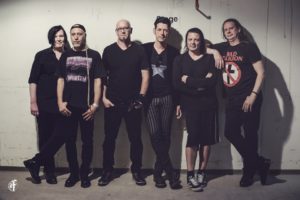 Germany, when we entered this huge venue feeling like we took the same pill as Alice. Our first tour in Russia, where we met crowds who were able to sing along to our songs in places we’ve never even heard of before! Or our KASBEK record release show when ex-Placebo’s Steve Hewitt joined us on drums… There are really so many things….
Germany, when we entered this huge venue feeling like we took the same pill as Alice. Our first tour in Russia, where we met crowds who were able to sing along to our songs in places we’ve never even heard of before! Or our KASBEK record release show when ex-Placebo’s Steve Hewitt joined us on drums… There are really so many things….
4. When you embark on new material, where do you get your ideas?
Peer Lebrecht: Where does inspiration come from?
Honestly? I don’t know. It seems to be around. The things you see, the words you read, the tunes you hear… I can´t point at a certain trigger neither can I sit down and wait for muses to do their job. As long as there´s a breath and a heartbeat you can change their frequency and all what is causing that is inspiring. In some way or another.
There are so many things around you, perceptive radiation, piercing you, reflecting, absorbing and like sediments, some things deposit on the bottom of the foggy ocean of your subconsciousness and if there´s a stir, a change of temperature and density, it all comes up again. And if you are at the right place at the right time, it can become an idea that´s filling your head. It is that easy…..
5. Who do you think is your audience? I believe some genres have merged into others and a soft gothic genre could easily interest people who enjoy either soft rock or dark electronic music. Has this given the band the ability to gather fans from further reaches? Has it perhaps alienated original gothic fans?
Peer Lebrecht: Obviously people who like the things we do! But I know what you mean. It´s true that over the years, people who show up at concerts became more diverse and it´s a fact I really like. The same way we didn’t want to satisfy the definitions of a particular genre, we don’t want to have rules for the clothes that people who like our music wear! Or their mindset. And yes, when it came to the unearthing of the post-punk label a few years ago and the undermining of the stiff and set goth rock structures, it changed a lot. The scope of musical and stylistic acceptance widened and so did colors on the palette. There are many bands out there today which seem light-years away from the original goth thing and nevertheless they attract the folk, play the prestigious 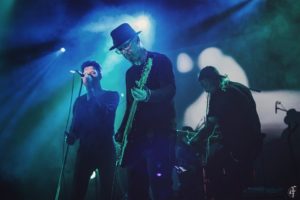 festivals and become the big names! And I really embrace that idea. Somehow some genres suffered from their self-made boundaries and their elitist caginess and as mentioned above, I never felt quite comfortable with limitations of expression and we always had people who liked our music without being involved in the whole goth thing. So I´m glad about this development. The current scene (if using that term for the likes of goth rock, dark wave and all the other pigeon-holes) is really interesting and exciting, what is a good thing if you run an annual festival that feature that kind of music!
festivals and become the big names! And I really embrace that idea. Somehow some genres suffered from their self-made boundaries and their elitist caginess and as mentioned above, I never felt quite comfortable with limitations of expression and we always had people who liked our music without being involved in the whole goth thing. So I´m glad about this development. The current scene (if using that term for the likes of goth rock, dark wave and all the other pigeon-holes) is really interesting and exciting, what is a good thing if you run an annual festival that feature that kind of music!
6. Based on your new material and your new album, will the band be touring?
Peer Lebrecht: According to the “profane” side of the coin and the fact that we all have jobs for getting over the daily obstacles, it is not that easy for us to do long and extended touring. And to be honest – meanwhile it´s not the most comfortable thought anymore to spend hours and hours in cars and on roads, jumping from place to place without being somewhere actually. We do shows when the circumstances are pleasing or the geography is attractive. I don’t want it to feel like work, it´s about joy and fun at the end. And yes, we did some shows with the KASBEK songs and there are a few ahead…
7. What was it like working with other singers with the new songs?
Peer Lebrecht: Oh, we haven´t done this so often up to now! KASBEK´s “Dust & Dew” is the second time we tried to bring in new colors in the picture.
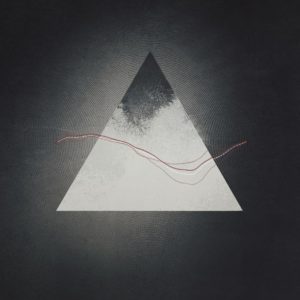 There was “Missing” on the MALVS album on which Froxeanne from The Frozen Autumn added a few lines with her really special voice, but it was more like a final seasoning, an additional layer, so to say. We had this song and I felt there was something missing (sic!) and when I asked her she immediately accepted, came to the studio, sang her first-take lines and it was done. I like the song very much but it was more a guest appearance than a collaboration.
There was “Missing” on the MALVS album on which Froxeanne from The Frozen Autumn added a few lines with her really special voice, but it was more like a final seasoning, an additional layer, so to say. We had this song and I felt there was something missing (sic!) and when I asked her she immediately accepted, came to the studio, sang her first-take lines and it was done. I like the song very much but it was more a guest appearance than a collaboration.
So other than… with “Dust & Dew”… Shannon and I know each other from a few shows we played together in Germany and Denmark and we stayed in close contact since then. She´s a brilliant person and we share so many similarities when it comes to passion for music, books and arts. So we’ve had this idea of doing something together for a very long time already. And making the song was a real joy. We wrote the lyrics together, she added those amazing analog textures to the surface and when she finally put her voice on it, it didn´t feel like being separated by oceans and a handful of time zones anymore. It´s really a special song for me, full of density and intensiveness.
8. Does the band look into modern technology for advances with music and progression? Touching on a previous question, should a band in a certain genre make sure it stays securely where it is or would there be boundaries to push with a possibility to reinvent that genre?
Peer Lebrecht: As an answer to this question, please let me cite one of my main and all time influences:
“If you feel safe in the area you’re working in, you’re not working in the right area. Always go a little further into the water than you feel you’re capable of being in. Go a little bit out of your depth. And when you don’t feel that your feet are quite touching the bottom, you’re just about in the right place to do something exciting.” – David Bowie
 9. The music industry has changed largely over the last few years, with music being streamed, with more and more artists flooding the market, with fans not always realizing how much a band or artist rely on them. Does Golden Apes worry about any of these things or are you adapting ways to stay in the game and do what you do?
9. The music industry has changed largely over the last few years, with music being streamed, with more and more artists flooding the market, with fans not always realizing how much a band or artist rely on them. Does Golden Apes worry about any of these things or are you adapting ways to stay in the game and do what you do?
Peer Lebrecht: Let´s be honest – if you are making music and you´re stepping out of your rehearsal room into the sunlight, you have to be sure what you want. Being in the game is asking for a lot of things and many of them don´t have to do with music at all. I even can´t tell you if we are in or not ‘cause I don´t know the measures, but I can say that we failed to raise commercial attraction from the very beginning. Ha Ha Ha! When other bands are touring the world with their debut album in the bag, we had already done three before we got some public attention. We spent the first years locked in rooms doing music and it seems always suspicious if a band is around for a while but you have never heard about it! So, we never had any support from a booking agency, our record labels were small and limited in their actions (our first record label was based in Russia with no distributing rights for Germany, makes sense, eh?), we had no promotion or media support nor any DJs who played our songs… so we did all on our own and in the light of our limited knowledge, insights and possibilities, I´m quite proud of the things we´ve achieved so far. So I don’t care about the metamorphosis of the industry ‘cause we never cared about it at all. Attention, now it gets pathetic: It was always about making music! In the first and the last place, and nothing else.
10. Where can new listeners find and discover music by Golden Apes?
There are these “usual” platforms you can try and test some of the stuff we have done so far. Our homepage (goldenapes.com), bandcamp, the obvious social media channels….it´s not that difficult to find us there…
live pics by Anastasia Philippova


